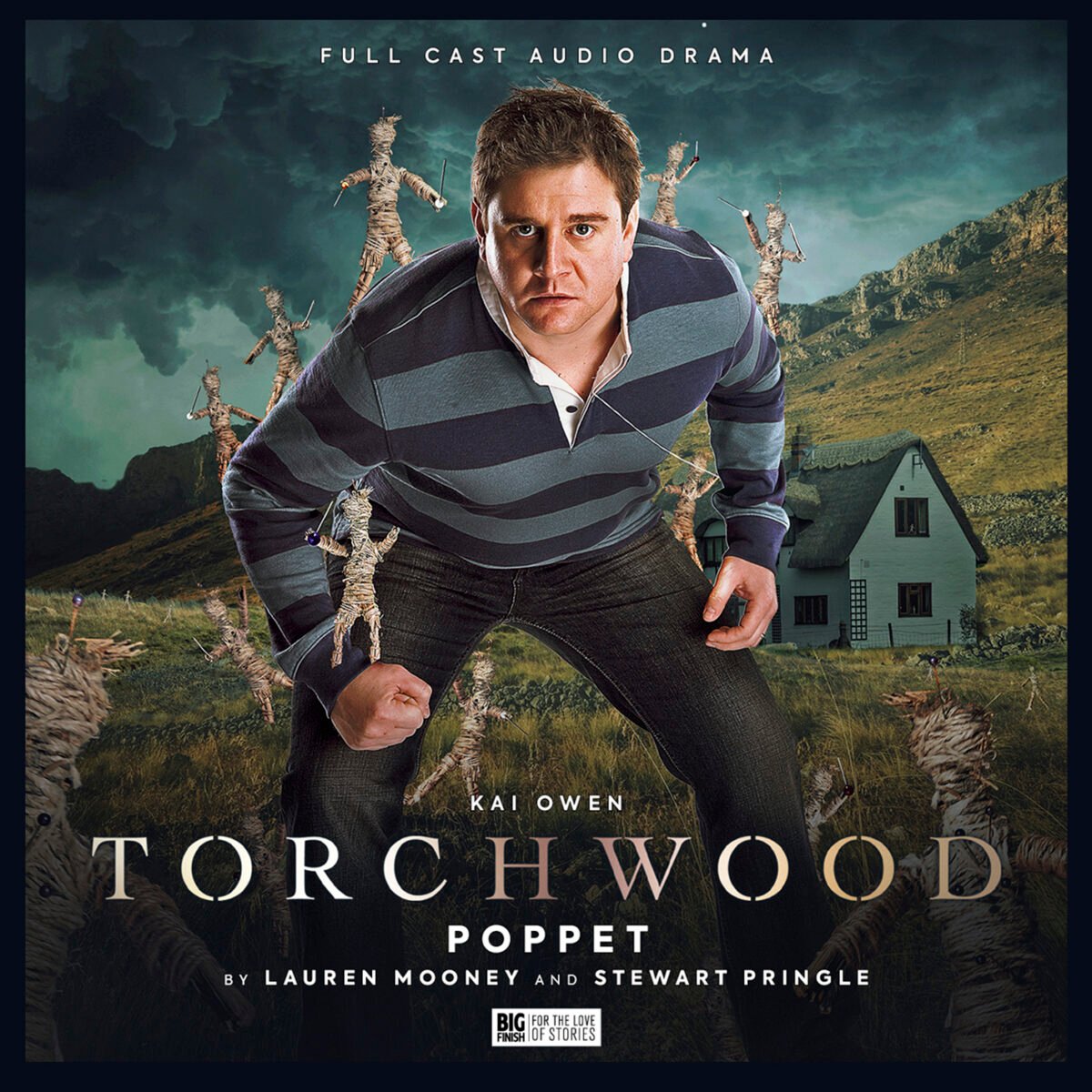Big Finish’s Torchwood monthly range reached 80 releases at the start of 2024 with the Rhys Williams-focused Poppet in January and the reunion of Dorothy McShane and Mr Colchester in February’s Sabotage.
Poppet is written by Lauren Mooney and Stuart Pringle and hits the same marks as their previous story Dog Hop from last September in being so Welsh, so emotional, so bizarre, so brilliant, and so Torchwood.
The setting is a town in rural Wales, and Rhys is living there since he is on the run (but not with Gwen). It’s not clear at this point when in the show’s timeline this is, whether it is post-Children of Earth or set during Among Us, but it does not matter.
It begins with Rhys working in a café called The Witch’s Cauldron and chatting to his colleague Maia (described in the behind-the-scenes interviews as a middle-aged goth), while a woman is at the school opposite searching for her missing son, David. It’s great emotional acting, and there’s a punch in the gut moment when before the titles come in a teacher at the school says that no such child exists.
Catherine, the distraught mother, then heads to the pub and reveals she lives just out of town while probing Rhys’s living situation. There’s already some spookiness abound…
Emily Burnett, who plays Catherine, does an amazing job giving a detailed description of life with David and sucking not just the listener but Rhys into this mystery of a child who seemingly does and does not exist. While the child is the plot focus, the story follows Rhys so there are more pub shift scenes and casual conversations interspersing his investigations into David’s existence.
He visits Catherine’s cottage several times, and each trip raises more questions and makes the story more spooky. There are marks on the walls, a nosey neighbour, an unexpected sight in David’s bedroom, and a husband who is less welcoming of Rhys’s help than Catherine is.

Maia’s knowledge of weird Welsh history corresponds with what Rhys witnesses in the house, and it’s still no clearer what’s happening and who is behind it when the poppet, an effigy used in powerful dark magic which the story is named after, appears. Which keeps everything nice and tense.
A brilliantly delivered admission from Catherine’s husband which features such authentic dialogue provides one possible answer, and works to stop the listener targeting their suspicions on any one character, but then on Rhys’s next trip to the house he learns of a totally different background story and the poppet seems to hold even more significance.
Since Torchwood is at heart an adult drama, it can utilise domestic settings that may be sinister, unsettling, overly sexual, or just icky, and that approach is finely used here to show that Rhys has got himself too involved. And whatever he experiences, the listener has to go through too. Very effective if it makes your skin crawl.
There’s no paganism at play but there is plenty of gaelic inspiration in the poppet and its associated activities, and still the story manages to hold off making it truly predictable what Rhys and the listener should be most worried. Sure, there’s a lot of spooky and unsettling stuff, but Maia says such weird goings on are probably for those purposes rather than something more sinister. Is she right that fun is being had at Rhys’s expense, or is worse occurring?
As that question starts to enter the listener’s head, so Rhys starts to lose his, pushing the conclusion further down the line and meaning that he will have to get even more involved – and probably more traumatised – to resolve the mystery of David, his family, and their house.
Kai Owen pulls off that job in a great way, and the listener is even treated to a little more backstory about what brought Rhys to the cafe. As he unwinds though it’s unclear where is safe, what is real and who he should trust.
Rather aptly Rhys makes his final visit to the house during a thunderous and scary storm, and all of the sound effects are turned up to 11. There’s wizened and raspy voices, and the scraping and creaking of wood, as if this was a crossover with a darker version of the already dark Pinocchio.
Many of the horror boxes are ticked here with body horror, emotional trauma and mental torment, haunting anthropomorphism and a resolution which relies on quite a violent action to take place.
Every single character is perfectly cast, and all of the actors are on top form in a highly atmospheric ending where not everyone can survive. The writing delivers in every area it needs to, including two epilogue scenes which allows Rhys to put a line under what happened and decide what he should do next.
In contrast to the brilliantly horrific Poppet, James Goss’ Sabotage fails to deliver with the Colchester/McShane double act that usually works so well.

Ace, formerly a companion of the Seventh Doctor and head of humanitarian firm A Charitable Earth, and Torchwood Three member St John Colchester have previously been made to work together in the The Red List and Death in Venice. He has his Torchwood-way of doing things, and she has her very different (and sometimes explosives-laden) approach to solving problems.
This time, they encounter each other in India, where a mining firm has displaced a whole village to a resettlement camp and has employed Colchester (who needs the money when his Torchwood income is lacking) to stop the sabotage attempts that have been hitting their facilities. Ace, meanwhile, is representing her charity and therefore the voices of the displaced locals.
This time, their frosty but usually productive relationship is put to the test by the fact that Ace is behind some of the sabotage taking place, which we find out in a pre-titles scene that does an effective job of introducing both characters to the story.
There’s a lot of each acting like they know more than the other, and specifically acting like they know what the other is planning and has been up to, and the consequences are laid out early on. The longer the villagers are displaced, the more likely it will become permanent, but the more sabotage takes place, the higher chance an environmental catastrophe could occur that permanently displaces the locals anyway. Or at least those are the cards that Ace and Colchester lay down on the table against each other. Each tries to convince the other that the actions they are ‘supporting’ are worsening the situation, and therefore subtly encouraging them to use their influence to make the people they’re representing do something different.
It doesn’t make for a riveting story, even once extra elements are introduced such as the reveals of Ace’s work being funded by the mining company and ancient artwork and geoglyphs covering the whole side of a mountain, and while the main characters test each other’s trust it is done more often for comedic rather than dramatic effect.
There are lots of cuts as the story jumps forward in time, sometimes by days, and there’s still not enough dramatic tension between the main pair while others take more extreme actions and the stakes get higher.
The death of one of the more important side characters does provide drama, and more confrontational dialogue between Ace and Colchester (but in which direction would be to spoil) that then prompts one of the pair to start playing more games with the other to advance their cause. But again it does not lead to much and when finally a more Torchwood spin is put on things later in the story, which maybe even harks back to Miracle Day, it doesn’t feel like there’s been enough set-up for that to make the audience care.
It does lead to some scenes which are staples for the respective lead characters (clue: explosions), but then the story just ends. It’s the weakest release in this Big Finish range for quite a while, and by this point Ace feels exhausted as a character to incorporate for dramatic potential. Maybe a different returning name would have made for a better counterpart to Colchester in this setting where there was a need for espionage.
Torchwood: Poppet and Sabotage are out now from Big Finish.



